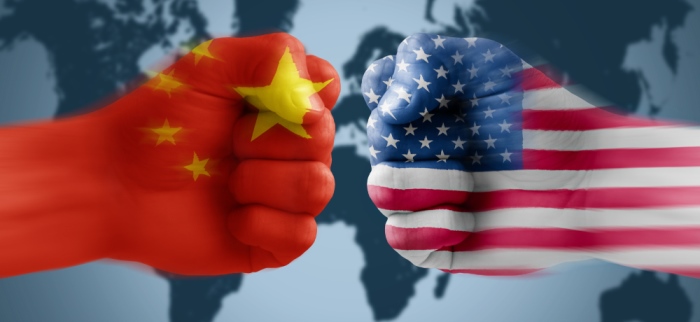
Washington’s sense of competition with Beijing appears likely to endure. And so long as that is the case, geopolitics seems likely to trump economics in America’s trade policy.
* * *
It is commonplace (and true) to say that President Donald Trump’s ongoing economic confrontation with China raises profound questions for the global economy. Nevertheless, most reporting on the US-China trade dispute seems to focus on the simple questionsーwho buys what from whom, how changing trade patterns could affect individual sectors of America’s economy or society (especially Trump’s supporters), and how a trade war would affect other nations. Few have sought to address tougher questions about the role of foreign trade and investment in America’s broader economic, foreign policy, and national security strategies.
For most of the post-Cold War eraーsince then-President Bill Clinton sought to forge a new Democratic Party that embraced trade agreements, including NAFTA, one of Trump’s favorite targetsーAmerican politicians have presented US society with a broad, bipartisan consensus that trade is good and that more and freer trade is better. While some disagreed with this view, few opposed it. Trump’s election and subsequent policies have changed that, but will Trump’s greater skepticism outlive Trump’s presidency? This is the central question.
The answer is so far unclear and, indeed, will likely emerge only when Americans themselves sort out the meaning of Trump’s election. The 2020 election campaignーand outcomeーwill be essential tools in that process. The 2018 midterm elections will be less helpful in understanding this, mostly because Americans won’t be selecting a president, even if the voting proves to be a widely-expected referendum on the president’s leadership. For the present, the best we can likely do is to think about broader strategic drivers and underlying trends in American society.
Geopolitics : The Main Driver
The most important driver is the intensifying US-China geopolitical rivalry. For many Americans, this puts trade with China in a separate category distinct from trade with other nations, whether allies, partners, friends, or just someone on the other end of a necessary transaction. The conservative intellectual and writer Daniel McCarthy explained this by saying that the Americans he terms “economic nationalists” seek not only prosperity but also an enduring middle class (which requires fairer trade), and to ensure that the United States maintains the industrial capacity necessary to win a major war (which requires protecting key industries) [ https://www.nytimes.com/2018/03/08/opinion/trump-tariffs-economics.html ]. As McCarthy put it, “if the price of national security and a durable, free middle class is a modest reduction in gross domestic product, the economic nationalist is willing to pay it.”
From this perspective, ordinary Americans look more like McCarthy’s economic nationalists than their business and political elites. Indeed, when presented with a choice between slow growth and a continued economic lead over China, on one hand, and rapid growth that made China’s economy larger than America’s, on the other, a slim majority chose slow growth in a 2012 pollーlong before Mr. Trump’s candidacy. Republicans chose the slow growth option by more than a three-to-one margin (62% to 17%), independents by more than two-to-one (54% to 23%), and Democrats by a large plurality (44% to 24%). (Democrats were also most conflicted on the issue, with 31% saying they did not know how to answer, with only 21%-22% of Republicans and independents responding that way) [ https://cpb-us-e1.wpmucdn.com/sites.dartmouth.edu/dist/b/1324/files/2017/07/poll-responses-by-party-ID.pdf ].
It is useful to recall in this context that the creation of the World Trade Organization and the surge in free-trade agreements occurred only after the collapse of the Warsaw Pact and the Soviet Union during a period when the United States considered itself dominant in the international system. China joined the WTO in 2001, some 10 years after the USSR’s disintegration, and Russia became a member only in 2012, more than 20 years following the end of the Cold War.
One could reasonably argue that significant economic and human rights concerns delayed US acceptance of China’s accession. This case is much harder to make in assessing Washington’s much slower process in approving Russia’s WTO membership, however; Russia’s economy created fewer problems for America, and its human rights record was certainly no worse than China’s.
In retrospect, Russia’s status as a former superpower rival, and the various political anxieties that flowed from this, appear to have been more important. With a US National Defense Strategy that formally describes “inter-state strategic competition” as “the primary concern in US national security,” it should hardly be surprising that strategic considerations would become more influential in economic decision-making today, especially where China is concerned [ https://www.defense.gov/Portals/1/Documents/pubs/2018-National-Defense-Strategy-Summary.pdf ].
Confronting Allies
What is perhaps more surprising is the way the Trump administration has pursued the president’s desire to get better deals from US trade partners and to protect US interests vis-à-vis China. Confronting China on trade may well make sense on multiple levelsーpolitical, economic and strategic.
But confronting not only China but America’s allies in Europe and Asia at the same time does not make sense at all; a more logical approach would have begun with pressing for concessions from Trans-Pacific Partnership (TPP) members and only then moved on to the dispute with China. This would have provided US negotiators a stronger position and would probably have somewhat limited domestic political fallout from disruptions in US-China trade.
If the US succeeded in wresting concessions from China, a track record of two wins (on TPP and with China) would have established considerable credibility and momentum in dealing with Europe. This is not to endorse either threats or real trade wars as a negotiating tactic but rather to point out that if President Trump was determined to fight in this way, he could have done so more effectively.
What happens after Mr. Trump remains to be seen. Yet absent the rapid resolution of US-China disagreements on trade and on a range of other issues, Washington’s sense of competition with Beijing appears likely to endure. And so long as that is the case, geopolitics seems likely to trump economics in America’s trade policy.
